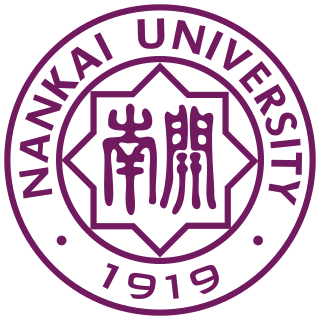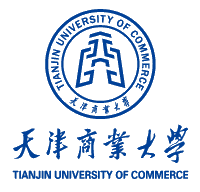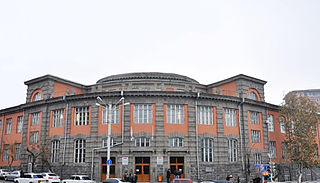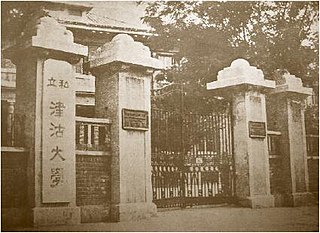Related Research Articles

Tianjin is a municipality and metropolis in Northern China on the shore of the Bohai Sea. As such, it is not part of a province of China. It is one of the nine national central cities in Mainland China, with a total population of 13,866,009 inhabitants at the time of the 2020 Chinese census. Its metropolitan area, which is made up of 12 central districts, was home to 11,165,706 inhabitants and is also the world's 29th-largest agglomeration and 11th-most populous city proper.

Nankai University is a public university in Tianjin, China. It is affiliated with the Ministry of Education of China. The university is part of Project 211, Project 985, and the Double First-Class Construction.
Nankai (南开) is a family of schools in China founded by Yan Xiu (严范孙) (1860–1920) and Zhang Boling (张伯苓) (1876–1951). The schools include:

Tianjin University, previously Peiyang University (北洋大學), is a national public research university in Tianjin, China. Established in 1895 by a royal charter from Guangxu Emperor, Tianjin University is the oldest university in China, leading the country's significant shift towards modernization and development. The university is affiliated with and funded by the Ministry of Education of China. It is part of Project 211, Project 985, and the Double First-Class Construction.
The Tianjin University of Finance and Economics is a public university in Tianjin, China. The university was founded in 1958 and is one of the earliest offering applied economics and business administration in China.

The Tianjin University of Commerce is a municipal public university in Tianjin, China. The university is sponsored by the Tianjin Municipal People's Government.
China Europe International Business School is a business school headquartered in Pudong, Shanghai, China.

Chongqing Nankai Secondary School (重庆南开中学) is a public secondary school in Shapingba, Chongqing, China.

Tianjin Nankai High School is a college-preparatory high school in Tianjin, China. This is the original Nankai High School, and it is often referred to as Nankai High School in Tianjin to differentiate it from Chongqing Nankai Middle School, its sister school in Chongqing. Nankai is notable as one of the first modern secondary schools in China, and boasts several of the most notable men in modern Chinese history as its alumni. The main campus is located at 22 Nankai 4th Rd in Nankai District. The other two campuses are in Sino-Singapore Tianjin Eco-city and Haihe Jiaoyu Yuanqu, Tianjin.
The Southwestern University of Finance and Economics is a public finance and economics university in Chengdu, Sichuan, China. It is affiliated with the Ministry of Education, and co-funded with the Sichuan Provincial People's Government. The university is part of Project 211 and the Double First-Class Construction.

Chang Po-ling was a Chinese educator who, with Yan Xiu, founded Nankai University and the Nankai system of schools.

The Armenian State University of Economics (ASUE) is a state-owned university of economics in Yerevan, the capital Armenia, founded in 1975.
The Guanghua School of Management, Peking University (北京大学光华管理学院) is the business school of Peking University, a public university in Beijing, China.
Ji Xiangqi is a former Chinese politician and business executive. He was the Vice Governor of Shandong and the President of Shandong Commercial Group. On January 4, 2018, Ji Xiangqi was placed under investigation by the Central Commission for Discipline Inspection.

Nankai Institute of Economics is an economic research institute affiliated to the Nankai University School of Economics. It is located within the university's Balitai campus at Nankai District, Tianjin. The institute was founded in 1927 by He Lian and Zhang Boling, was originally named Nankai Committee of Sociology and Economics. It changed its name into Nankai Institute of Economics in 1931, and then established the tenet of the institute, which is to "know China and serve China". The systematic social research that the institute has conducted was ahead of its time in China. The Nankai Price Index, compiled in 1927, was the very first price index in China and the most important reference to the study of Chinese economy during that time, indicating that it was rather influential and of high academic value. The institute was then regarded as the authority of Chinese economic studies during the period of Republic of China (1912–1949).
Gong Ke is a Chinese electronic engineer and administrator who served as president of Tianjin University from 2006 to 2011 and president of Nankai University from 2011 to 2018. He was an alternate member of the 18th Central Committee of the Chinese Communist Party. He was a delegate to the 11th and 12th National People's Congress

Tsin Ku University, was a Jesuit Catholic university established by the French Jesuits in Tianjin, China. It was the second Catholic university in China and one of the earliest universities in modern China to offer architectural education. Founded in 1921, its official name was originally French: Institut des Hautes Études Industrielles et Commerciales de Tientsin, translated into Chinese as 天津工商大学. In August 1933, it was officially registered under the Ministry of Education of the Nationalist Government as Private Tientsin Kung Shang College (私立天津工商学院). In October 1948, it was restructured into a university and named Private Tsin Ku University (私立津沽大学). In September 1951, it was converted from private to public and became subordinate to the Ministry of Education. In August 1952, as part of higher education restructuring, Tsin Ku University was dissolved. The engineering college merged into Tianjin University, the school of finance and economics merged into Nankai University, and based on its former campus, the Teacher Training College of Tsin Ku University became Tianjin Teacher Training College, which later evolved into Hebei University. In November 1970, Hebei University relocated to Baoding. Some faculty and students who did not move established Tianjin Foreign Studies Institute on the original Tsin Ku University campus, which has since been upgraded to Tianjin Foreign Studies University.

Nankai University is located in Tianjin, People's Republic of China. It was co-founded by prominent modern Chinese educators Yan Xiu and Zhang Boling, originating from the establishment of Nankai School in 1904. In 1919, the university division of Nankai School was formally established.

Tianjin Institute of Foreign Trade was established in January 1983. It was one of the four higher education institutions directly under the Ministry of Foreign Trade and Economic Cooperation. The institute was located at 100 Yingshui Road, Nankai District, Tianjin. In 1994, Tianjin Institute of Foreign Trade was disestablished and merged into Nankai University.
Nankai University Affiliated Hospital, located at 4 Weishan Road, Xiahaidong, Hexi District, Tianjin, was formerly known as Tianjin Fourth Hospital, also referred to as Tianjin Burn Special Hospital.
References
- ↑ 侯自新 (1998年). "深化高教体制改革 提高办学质量和效益 ——南开大学合并天津对外贸易学院的过程模式". 中国高教研究. 第2期.
- ↑ 张家然 (2018-04-12). "南开大学EMBA因违规办学被撤销招生权,分管副校长被免". 澎湃新闻. Retrieved 2018-04-13.